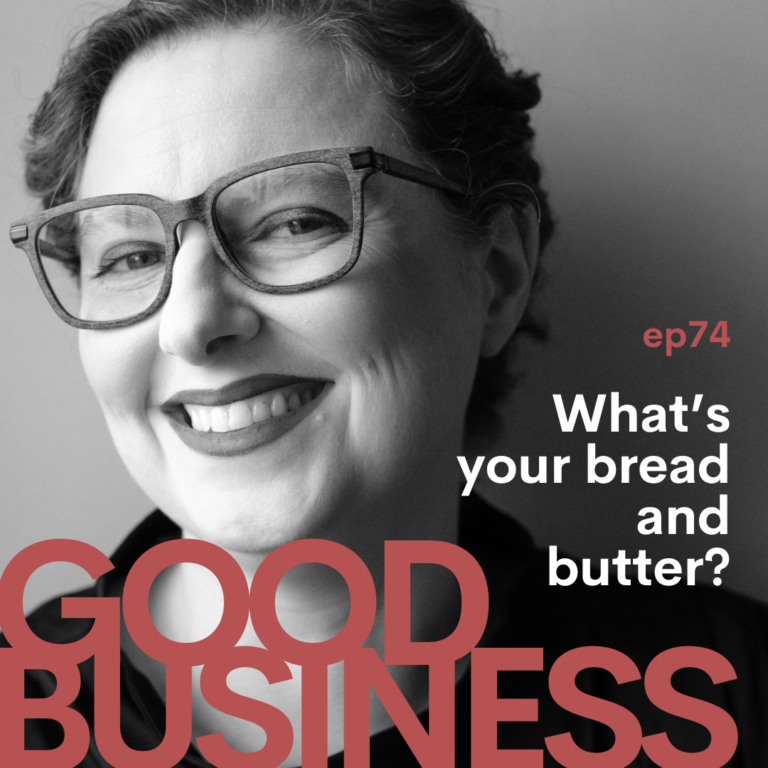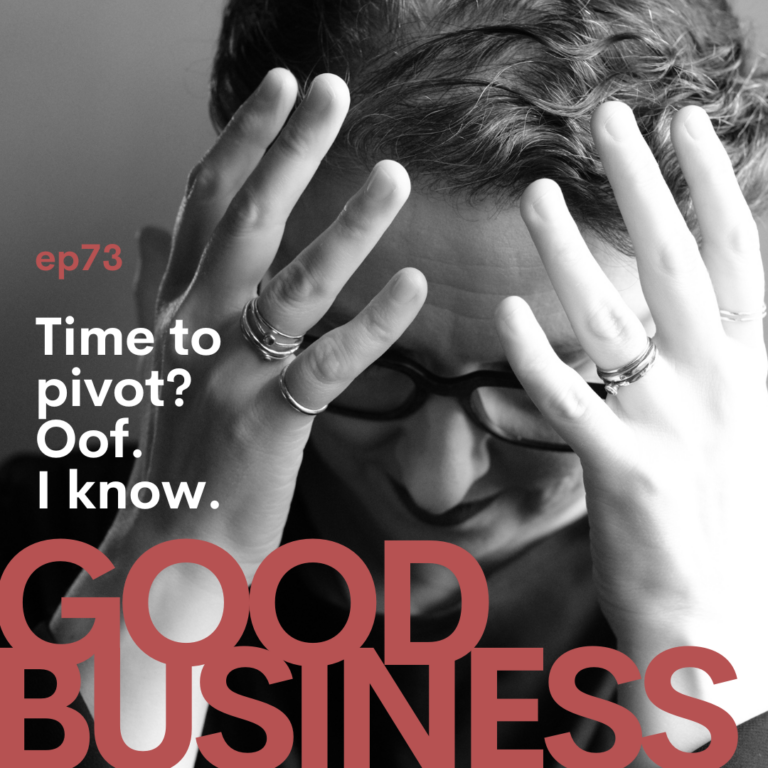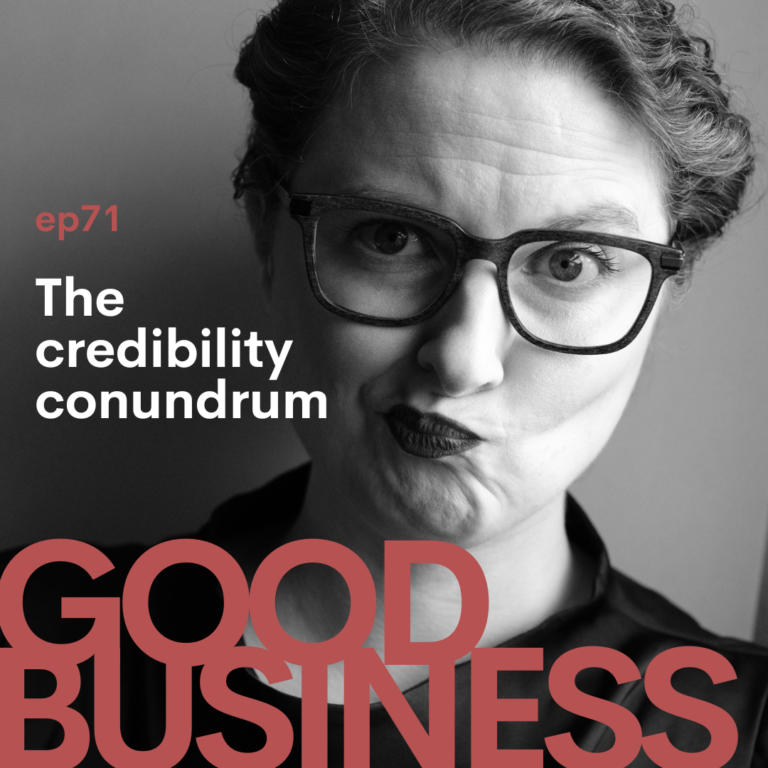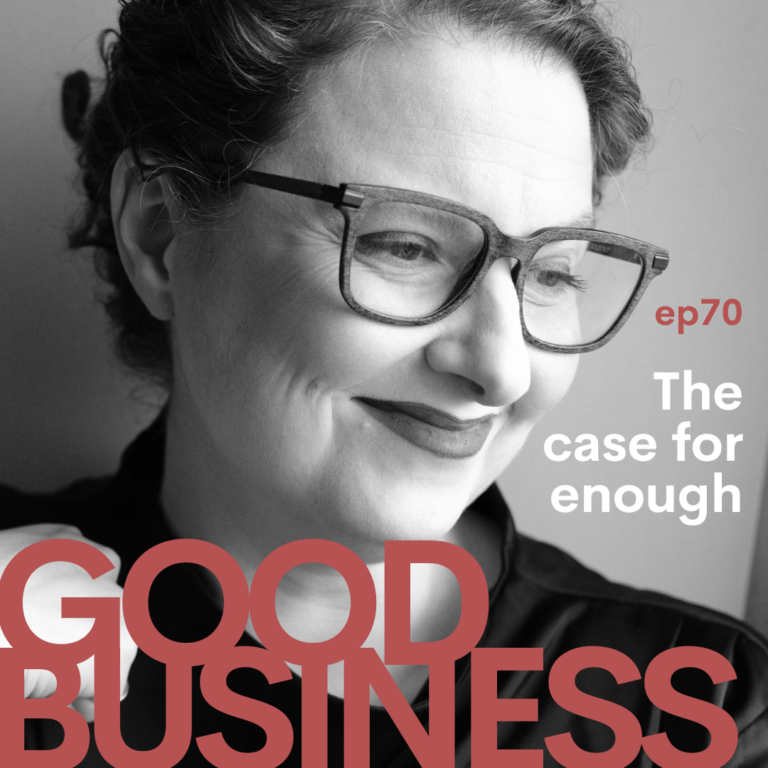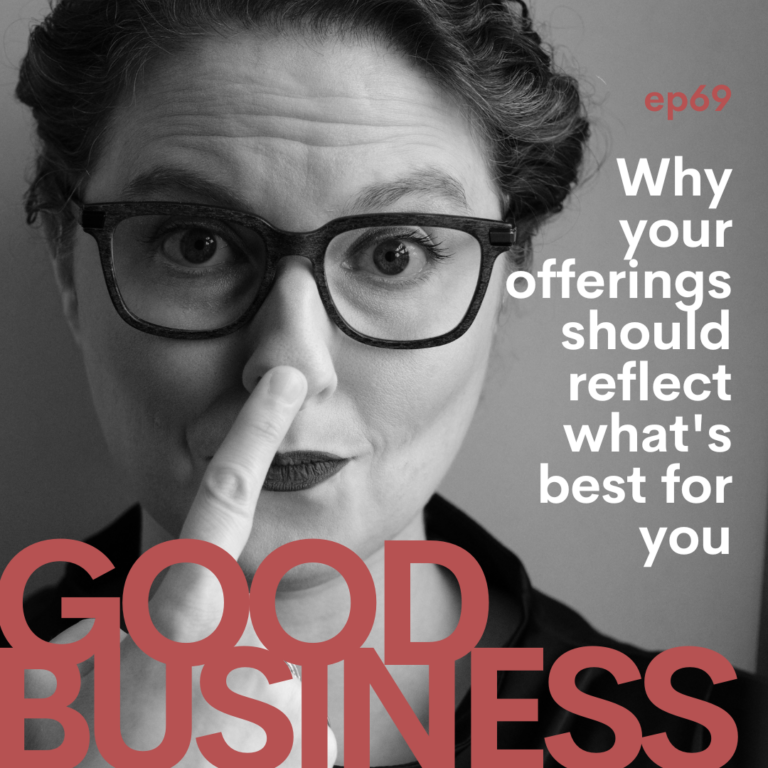Today’s episode is about leadership. What leadership is, what it isn’t, what it means, and why it’s important.
Episode Transcript:
Hi everybody, welcome back to the Good Business, I’m so glad you are here with me today. I want to start this conversation with something really important. I want everybody to understand what my intention is, when I embark on a podcast episode. Usually, it’s to teach you something, whatever’s top of mind for me that day. That’s usually kind of how I’ve approached this, but this episode marks something entirely new.
I have been sitting on a body of work for a very long time around what leadership is, what it isn’t, what it means, and really, why it’s important. And today marks the beginning of something entirely different than what I’ve done here in the past, and that is we’re going to start at the beginning of, what feels like a narrative to me.
Today’s episode is the starting line for 12 months of content where we’re going to talk about leadership in terms that you very likely haven’t really ever thought about it in before. You know, leadership tends to mean something different for a lot of people, it means authoritarianism, it means power, it means something that we can’t control, right. It means people who have somehow gained something that most of us don’t have, and it gets thrown around in ways that we don’t really pay attention to all that much, honestly, you know, we tend to regard our leaders as the people who are most successful.
Which isn’t really leadership.
So I’m going to talk a lot. About what I think leadership is over the next year, and I hope that you’ll join me in that conversation.
So each of these episodes is going to be a piece of a puzzle. Now you don’t have to listen to them in order, but they will sort of hang together, and listening to them in order would basically be like getting a master’s course in leadership because it is something that is really everything to me. Everything that I do falls into either growing your skills as a leader or flexing them, one of the two, and being really, really conscientious and deliberate about exactly what we’re doing here in this world and what we’re doing in our businesses. And I really want to be part of something that’s new and different, and I hope that you want to join me in that. So, if you’re still with me–which I hope you are– Today’s first lesson in leadership is about the concept as a whole.
What is leadership? When you think about it, I really want you to like, stop and pause and think about it. What are your connotations with the concept of leadership? How do you regard people who self-identify as “leaders”?
How do you think about yourself as one? What ways are you leading and what ways are you following? And even when you’re following, are you aware of the power that you have?
You’re going to hear me talk a lot about power. Power and leadership are two peas in a pod. They are two sides of one coin, and a lot of the people who tend to gravitate towards my work, really love the idea of rebellion. We are shit disturbers we like to rattle our sabers. We like to shout at the wind. We are the Don Quixote’s of the world, right. Tilting at windmills. And trying to make the world a better place.
Most of us, though, aren’t.
And that’s a bitter pill to swallow. And it’s one that we’re going to be swallowing again and again, together over this year. It’s learning to understand the power that we have and what we don’t have. So we know what we need to get.
Leadership means being able to actually step out in front and have the courage of your convictions and being able to understand what those convictions are, whether they’re real, what they mean to you, why it even matters. And figuring out if it’s something that you’re actively and consciously doing, and whether you’re walking the walk, or whether you’re just kind of going through the motions of habit, of some concept of leadership that you learned at a job when you were 15 years old.
You know, I find myself behaving as a manager in ways that I learned from a retail manager when I was 19. Cause he was really great. I also know that I could just as easily go the inverse and lead in a way that embodies the worst traits of the people I observed. Because it’s far more prevalent, frankly. I think most of us have more bad examples of leadership than good ones.
So my challenge to you as a starting point for this conversation. And this is going to sound stupidly simple, but I really want you to work at it, like really think about it. When you contemplate the idea of real leadership, meaning someone who has the courage of their convictions, steps out on tiny, thin little limbs, understanding that those limbs might break because it’s in service of a greater good than themselves– that’s that’s my basic kind of baseline definitions of leadership, so that’s kind of what we’re working with today. When you think about it in those terms, who do you look to to model your own leadership style after? This is not a, “who do you look up to, who do you idolize, who are your heroes?” question.
When you think about people who lead really lead meaning they really walk the talk, they’re willing to make sacrifices for the people following them, they’re interested in forging new paths and they invite people to come along with them. They also understand what they’re capable of and they know when not to step out of their lane.
They respect the power that they possess. They understand it. They pay attention to it. And they know that it always has the potential for harm, because all power does.
And they use it the best way they can. And when they learn something new, they do better with it and they use it to serve the people that they are leading. When you think about people in those terms, who comes to mind for you, to model those traits and behaviors after? I’m betting it’s probably less than you thought it was.
Most people immediately go to like Oprah and, whoever the fuck else. Like, you know, but we’ve all seen our heroes fall, this isn’t about heroes. Like, because you got to know this person well enough to understand their behaviors, right, to understand what they actually do, how they manage, how they.
How they treat the people around them, how they lift them up, how they push them down, how they deal with things when there’s a problem, how they own their mistakes. Really think about who you know, and if the answer is no one, then I really invite you to come and listen to this show every single week, because it means that you have an opportunity to be that person for somebody else. But that skill and it is absolutely a skill is something that has to be cultivated and practiced, and it’s a muscle that has to be built and flexed.
Now I want to be really clear about one thing. I work very, very hard at being this kind of a leader. I don’t always succeed. I don’t always succeed in every area of my life. None of us will. This is not about perfection. This is not about some perfect version of ethics, and integrity and values and all of that. That’s not what we’re doing here because nobody on this fucking planet can hold that mantle.
I refuse to put myself in a position or, or invite you to put yourselves in a position, where everyone around you is going; “Yeah. If you’re in a glass house, you shouldn’t throw rocks at it,” right? None of us, none of us are doing this all right, and someone will always have fault with what you’re doing.
Always. There’s no doubt about that. And someone will always think that you are leveraging your priority, leveraging, excuse me, leveraging your privilege, leveraging your power, inaccurately. Now. I wish I could say that I had an answer for that. I don’t, you won’t learn how to navigate around that.
You might, however, learn how to stand up for your convictions, in that glow, right. When someone shining that light on you, to be able to say securely and confidently, that you understand where they’re coming from, and you wish you had more capacity to do better.
And be able to say whether you can, or you can’t. And be honest about it. That’s what we aspire to. Feet firmly planted, and a willingness to be humble. A willingness to put our values on display, and a willingness to entirely change the game of how leadership functions in this world, because the way we’ve done it forever, isn’t fucking working.
And there’s a lot of voices out there talking about human-centered leadership and mental health and values and ethics and ethical selling and all, right. I’m not the only voice here. But I hope that you’ll join me in bringing it all together. That’s the idea here. We’re going to bring it all together. I want to talk about power. I want to help you understand, the powers that you have and the ones that you don’t and how to, like deal with that. How to face that, like, you know what, most of us operate from underneath someone else’s boot.
Whether we like it or not. Whether we agree with that or not, it doesn’t change the fact that it’s true, right. We do not have the power that other people possess. We do not have the same access to justice that other people have, and there are many that have even less than we do. That doesn’t change the fact that we have less than others, we are all on a spectrum of how much power we do and don’t have in this society.
But what we do with what we do have, that’s what we’re talking about. Are you doing it consciously, or not? Are you in business to be in business and make a living? Or are you in business to make a difference? And if you really are trying to make a difference, if you really actually, if that’s actually true in your bones and not the thing that you tell people, then you have to learn how to lead. And it’s and leadership is not something that you just know how to do.
Nobody’s just a natural at this. It is a skill. It is an art. It is a level of presence and a meditation and a gift to those around you. It is also one that is full of sacrifice and most people are not even… We don’t learn how to do that. We don’t learn how to be empathetic to those around us. Not really. We have to learn those muscles. We have to flex them and we have to recognize that there’s a good chance that even if you think you’re deeply empathetic and extremely sensitive to the needs of others, that you probably fucking aren’t.
Because when the rubber meets the road, all of us, are self-interested. All of us. We have to know that going in, because then we can work with what we have, and work in reality. Until you work in reality, until you use real words, until you use real feelings, until you face who you really are, then you’re going to just keep running behind the ants in front of you, like you’re on tracks.
And we’ll just keep on doing everything the way, the very people we complain about, keep doing it, ‘cause it’s all we ever learned how to do.
My very big promise to you is that I want to help you break that. This year is about breaking that pattern and learning to lead. I hope you’ll join me. See you next week. Bye, everybody.
More Episodes
GB74: What’s your bread and butter?
Welcome back to Good Business. I’m your host, Illana Burk. Today, we’re talking about the most central parts of your work. The things that always feel true. The things that consistently make money. The things that people always...
GB73: Time to pivot? Oof. I know.
Welcome back to The Good Business Podcast. I’m your host, Illana Burk. Today, we’re talking about the very complicated moment when you realize that it’s time to make a significant change in your work. And these moments are never...
GB72: How to decide where to put your energy
Welcome back to Good Business. I’m your host, Illana Burk. Today, we’re talking about decision-making. Specifically, how do you decide where to put your energy around self-promotion when resources feel limited...
GB71: The credibility conundrum
Welcome back to the Good Business Podcast. I am your host, Illana Burk. And today, we're talking about credibility. What is it? Why do you need it? And how do you establish it in the age of the internet when you can...
GB70: The case for enough
Welcome back to the Good Business Podcast, everybody. I am your host, Illana Burk, and today we are talking about enough. So we begin with one word, and that word is more. That's what we're all supposed to want, right?...
GB69: Why your offerings should reflect what’s best for you
We’re diving into a topic that might just flip the script on how you think about your offers: “Why Your Offerings Should Reflect What’s Best for You Before They Reflect What’s Best for Your Clients.” Sounds counterintuitive. I know. Well, stick around because I’m gonna break it down in a way that’s both practical and super powerful.
First, I’m going to talk about what all this has to do with niching and marketing, then I’ll explain exactly how to do this, and finally I’ll dig into how this improves your leadership positioning.

